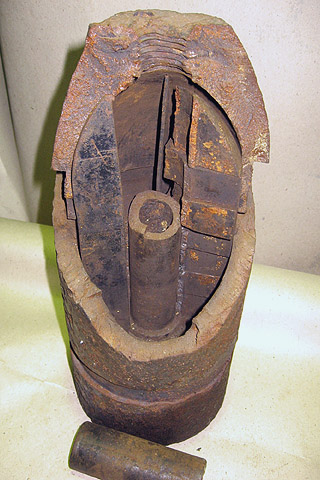Annachie wrote:Annachie wrote:Why the need to hit the guns? As always, it's the crew that is soft and squishy.
Bluesqueak wrote:Well, the crew are generally in close proximity to their guns. Successive generations of artillerists have found this helpful when trying to fire the things.


Slightly more seriously, shrapnel and overpressure means you don't need to hit the gun to get the crew.
Damage to the overhead structure droping bits on them, or rubble in the gun slot blocking the shots, also means you don't have to hit the gun.
Let alone morale.
Dilandu's point, which is valid, is that hitting individual gun
positions is difficult. From my own reading of naval history, including bombardment efforts of the Civil War (Fort Fisher I, a disaster for the Union; Fort Fisher II, a disaster for the Confederates; Fort Sumter I, victory for the Confederacy, practically no casualties; Fort Sumter II, the Feds turned it into a rock pile with, I believe, one gun still in action to be fired at sunset) to WW I (DeRoebuck in the narrows, guns in fixed fortresses silenced [in large part because surviving gunners skedaddled], Dardanelles II --- searching gunfire without air spot can't chase down and destroy the mobile Turkish guns), to WW II and Korea (Tarawa and Okinawa, massive bombardments with varying degrees of success; D-Day with high degree of success, including near destruction of the Herman Goering division of [mobile] panzers on the way to the beaches; South Korea and Vietnam, highly successful coastal shoots in ultimately stalemated or losing wars), he is
way too pessimistic about what breechloading guns with high explosive shells can do to fixed fortifications firing at relatively short ranges, especially with a handy balloon around to spot for you.
The ICN screwed up --- or, rather, the Inner Circle did (and guess what?
They can make mistakes, too) --- in their tactics (particularly the failure to have the SNARC incendiaries already deployed to the rocket barges). They were looking at their inside knowledge of what Thirsk and Ahlvarez were going to try and their object was to put the most possible pressure on Dohlar (in part to make sure Thirsk and Ahlvares
did launch their coup) while avoiding anything the Church might have been able to point to as "obvious demonic intervention" while
resisting the coup in the process. They were willing to risk losses in return for the political gains to be had, although Sarmouth, whose men would suck up those "acceptable losses," was less on board with that than the rest of the Circle.
The
real mistake, in many ways, however, was to make insufficient allowance for the unreliability of visual signaling in the midst of all that smoke and noise. There was plenty of time for
Eraystor to have avoided the rockets' fixed threat zone (which she wasn't originally supposed to enter in the first place; she sailed into it closing to cover the minesweepers and "engage the enemy more closely") . . .
if she seen the signal when it was sent and obeyed it promptly.











